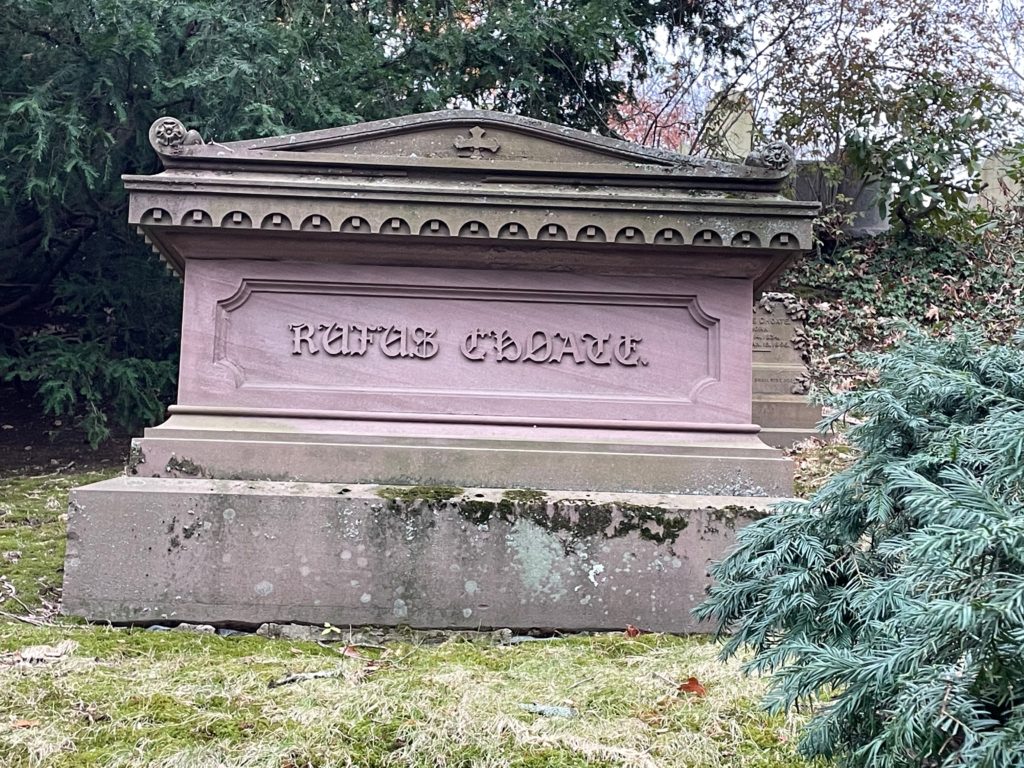Erik Visits an American Grave, Part 1,273
This is the grave of Rufus Choate.

Born in 1799 in Ipswich, Massachusetts, Choate grew up quite well off in the Early Republic elite of Massachusetts. He was considered something of a genius as a child with a prodigious memory for literature. He went to Dartmouth College and went to the Dane Law School, which was associated with Harvard. Well connected, he studied under William Wirt, who was then Attorney General, when he went to Washington in in 1821.
Choate was admitted to the bar in Massachusetts in 1823, became a prominent lawyer, and served in the state legislature. He moved to Salem in 1828 and soon became one of the leading lawyers of the area. He was elected to Congress in 1830 and was reelected in 1832. As you would expect from this type, he was a strong Whig who believed strongly in big tariffs. But he left Congress in 1834, even before his term was over, to move to Boston and practice law. This was really common at the time–I don’t know what the percentage is of Congressmen who left office in the middle of the term, but I’d guess it as well over 20 percent and much higher than that in the North. You could make a lot more money outside of politics and even then, being a member of Congress didn’t really mean you had much power.
For the next several years, Choate became a leader in the Boston legal community, while also becoming famous for his speeches on various issues and New England history. He was something of a successor to Daniel Webster‘s legacy and in fact when Webster left the Senate to become William Henry Harrison‘s Secretary of State, Choate was chosen to replace him in that body. There were four years left in the term and he completed it. He held pretty typical Whig positions. He was supportive of expansion into the Northwest, but opposed Texas annexation. He still believed in his beloved tariff. He supported a strong banking system too.
Choate gladly gave the seat back to Webster in 1845. He went back to his law practice and his talks, reappearing in public office in the mid 1850s for a short stint as state attorney general. He also became known as the first lawyer to win a case using a sleepwalking defense. A man killed his girlfriend, who was also a prostitute. Supposedly, this was because she would not give up her work. The man was a fairly rich guy, a son on a bad track, so she might not have needed the money, but that’s not the only reason people become sex workers. So he killed her, slashing her throat with a knife in her sleep. He hired Choate as his lawyer. Choate argued that he did kill her, but he didn’t know what he was doing because he was sleepwalking. He somehow won with this. In response, the guy actually tried to undercut Choate’s legal fees, arguing that since he was so obviously innocent as a sleepwalker, he shouldn’t have to pay so much to Choate. Let’s just say it was a lot easier to get away with killing a prostitute in the 1850s than in not paying your elite former senator lawyer.
While it seems like Choate would have become a strong Republican, he did not. He migrated to the Democratic Party in 1856 and supported James Buchanan for president. It seems that like many Whigs, he didn’t care that much about slavery. Moreover, he saw the Republicans as a purely sectional party that was a greater threat to the nation than the Democrats, no matter how disgusting the Democrats genuflection before radical slaveholders had become by that year. That proved to be a very poor move, but Choate saw Buchanan as a national candidate. In the end, Choate was a man of the Second Party System and its breakup was too much for him to take.
I wonder what Choate would have thought about the Civil War given his late life support of Buchanan, but we’ll never know since he died in 1859, at the age of 59. He was in Halifax at the time, but it was July so maybe he was vacationing up there.
Rufus Choate is buried in Mount Auburn Cemetery, Cambridge, Massachusetts.
If you would like this series to visit other senators who were in the world’s worst deliberative body with Choate, you can donate to cover the required expenses here. Silas Wright, Jr., is in Canton, New York and James Pearce is in Chestertown, Maryland. Previous posts in this series are archived here.


